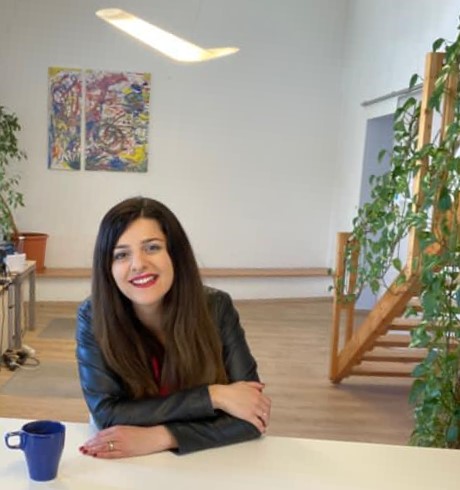Interview about: "Why we all need our own resilience cocktail"
with Marilena Maris: economist, personnel developer and executive coach.
Hello Marilena,
thank you so much for taking the time to answer our questions.
We are convinced that you, as an expert, can provide insightful answers!
The increased virtual working, the constant availability, and the simultaneous coordinating of one’s own household nowadays is draining the energy resources of many people and especially those of individuals in leading positions.
So, you might assume that currently good resilience skills are more and more needed and building resilience is the key to a balanced work life.

Marilena, I know that you have been working with thousands of leaders and experts in the past year on resilience. Can I bluntly ask you if this is the next “trending” topic?
This might even be true and honestly, it’s one of the trends I consider really useful 🙂 If we look around, we see that the past year has given us plenty of opportunities to deal with huge challenges. In these kind of moments, it is legitimate to look out for proven strategies and ideas on what to do next. Since resilience is backed both by science and experience, it’s pretty much bullet proof.
That’s why I am not surprised about the popularity of the topic. One thing I want to underline in this “hyped” conversation, though, is that resilience is not just coping with stress. Actually, resilience is the ability to deal with a critical situation in such a way that you generate success, growth and sometimes even joy.
If resilience is so popular and bullet proof, does this also mean it’s easy to achieve? If we look around, it seems like there still are many leaders and experts struggling.
Fair point. Theoretically, resilience is simple: it’s about how we react to a stimulus, like a challenging situation. In this reaction, there is usually a key moment, some call it even a turning point. If we get that right, it all becomes so much easier. Practically, there is a beautiful and complex combination of what we think, how we feel and how we act under pressure. And that is really really challenging, especially when you are under pressure.
Consider that daily we make between 20.000 and 60.000 decisions, hopefully the best ones. Those decisions rely on thinking and behavioral patterns and we are mostly not even aware of that, because we work quite a lot under pressure. So challenging how we “normally” do things is not really something which comes easy to many people, for sure not on a day full of back to back meetings and the whole saga.

So for the ones who are still struggling, how can we break down the complexity and build up resilience?
Let’s use a simple analogy. If I would give you the best cocktail in the world, how would this cocktail be?
It depends, right? It depends on what you think about cocktails, how you want to feel when you drink them and which ingredients are there available to create them. And then it depends on the specific situation, sometimes a fresh non alcoholic smoothie is all we need … and sometimes we go for the Tequila Sunrise. Other times we are up for experiments like designing a totally new cocktail.
Bringing back this cocktail analogy to resilience,
you can make sure that you develop your “cocktail mixing” abilities (your thoughts, feelings and the sharp understanding of what is needed in every situation). More so, you also need to make sure that all the ingredients of the cocktail are available or easy to access. The “ingredients” we need for the resilience cocktail are key factors, like emotion regulation, impulse control, smart problem solving (“causal analysis”), empathy, positive thinking and proactively going for challenges as well as our self efficacy. In real life you might observe that some of these key factors are easy for you and others aren’t. Work on the ones you find more challenging, that’s what will bring you the best results.
Now the cocktail idea sounds good. But it also sounds like a lot of work and nobody really has the time these days.
That’s true, time is not always on our side. Yet we need to invest time and energy to get outcomes. In my work, I make a deal with all the leaders I work with. They commit to 10-15 minutes a day to build up resilience and if it’s not working for a few weeks, they can stop anytime. So far, nobody stopped this deal, quite on the opposite 🙂
The principle behind is simple: building up resilience is preparing for a marathon, not for a sprint. We need good habits and we build up those habits daily, until they become “no brainers”. So just imagine that for 10 minutes daily, you would challenge something which is not doing you a favor any longer. It may be a bad habit like smoking or it may be a big fear like the fear of change. It may be the decision to make a short walk versus allowing pandemic news to ruin your mood. The catch is simple: instead of ignoring the issue, you focus and start actively dealing with it. Daily. For as long as it takes.
And the last question: is building up resilience only depending on what we do? What about the external factors?
Honestly yes. We will always deal with external factors, some will be more useful than others. Yet how we handle them is totally up to us. This is a provocative remark, I am aware of that.
Let’s take the most famous example, Viktor Frankl. He was one of the most brilliant minds the world can get on psychotherapy and his work started to be really incredible while he was trying to survive several concentration camps of World War II. He had to fight for his life and survive the loss of his wife and parents. And he chose to find ways to turn this horrific externally triggered challenges into a work which became a legacy.
Viktor Frankl sums it up quite well: “Between stimulus and response there is a space. In that space is our power to chose our response. In our response lies our growth and our freedom”.

Marilena Maris
Business economist, personnel developer and executive coach
Marilena Maris has been working with leaders and experts, on-site or virtually, in over 30 countries since 2008. She passes on her knowledge in the form of workshops, key notes, international programmes, coaching and training. She is particularly concerned with productivity and sustainable performance, also known as achieving results and keeping our sanity. She is also a shareholder and partner at MDI, holds a Master of Science in Executive Coaching & Training from the University of Vienna, and a BA in Business Administration from the International University of Applied Sciences in Krems aswel as several international certifications. She loves travelling and lives both in Austria and Germany as part of a patchwork family of 5 kids.

